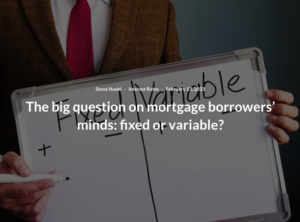
With variable mortgage rates potentially at a peak and fixed rates having recently retreated, borrowers are asking themselves the age old mortgage question: should you go fixed or variable?
It’s a decision being faced by anyone in the market to purchase and those with upcoming renewals. And there are two schools of thought given where rates are and the current market dynamics.
Some will argue that a variable rate makes the most sense for borrowers who aren’t risk-averse, since they’re potentially at or near their peak for this rate-hike cycle. Discussion has shifted from future rate cuts to the timing of potential Bank of Canada rate cuts, which are expected early next year or even late 2023.
Variable-rate mortgages generally also entail a lower three-months’ interest prepayment penalty should the borrower break the mortgage early.
On the other hand, variable-rate mortgages are currently priced well above their fixed-rate counterparts with a spread of more than a full percentage point.
“Usually with variable rates, you get a discount for taking on the risk that your payment could rise in future. And, you are typically rewarded for taking on that risk,” mortgage broker Dave Larock of Integrated Mortgage Planners told CMT in an interview.
He said people often cite research by Moshe Milevsky, a professor of Finance at York University, which found variable rates have historically outperformed fixed rates 88% of the time.
“The challenge now is that rates have shot up. We’ve seen the sharpest series of rate increases in the postwar era,” Larock said. “And the question then becomes, is it worth it to pay a premium today on the bet that your variable rates are going to come down over the next five years?”
Larock notes the current consensus recommends most borrowers to get a fixed rate, “And I would advise most people to do that.”
Ron Butler of Butler Mortgage agrees. He recently commented on the fixed vs. variable discussion in a Twitter thread under the heading: “Why nobody should take a variable rate that is higher than a short-term fixed rate.”
He said the post was in response to calls by some to take a higher variable rate today on the presumption that they will surely fall within the next year or two.
However, he argued that variable rates need to be lower than comparable fixed rates in order to justify the added risk the borrower is taking on.
“Variables need to be [at] a clear discount to fixed, typically a 1% to 1.25%-lower rate than short-term 1- to 5-yr fixeds,” he wrote.
He also reminded followers that if the Bank of Canada raises its benchmark rate any further, anyone getting a higher-priced variable rate today will potentially be paying even more in interest than had they taken a fixed rate, with no guarantee as to the timing that rates will begin to fall.
“It is crazy to pay extra for additional risk,” he noted.
If you do choose fixed…
For well-qualified borrowers considering a fixed-rate mortgage, most are likely better off committing to a shorter, more flexible term, says Rob McLister, editor of MortgageLogic.news.
“The Bank of Canada implies a higher probability that its next move will be a cut than a hike and market pricing supports that,” he told CMT. “That’s far from a given, however. Rate hikes are not completely off the table and it may take several quarters for prime to fall. At this point in the rate cycle, however, history suggests that a short term is nonetheless a risk worth taking…for those who can afford to be wrong.”
McLister said he doesn’t advise locking in for five years unless the borrower is extremely uncomfortable with rate volatility and/or unequipped to handle any additional rate increases.